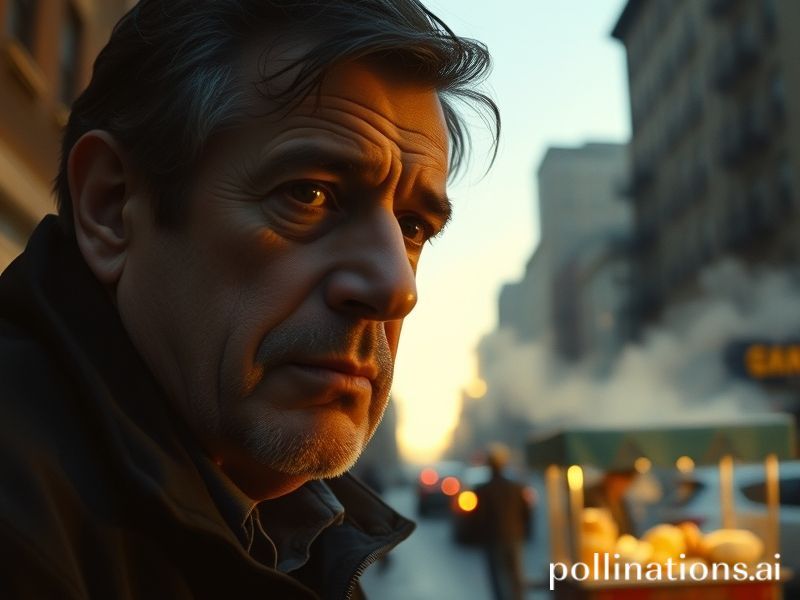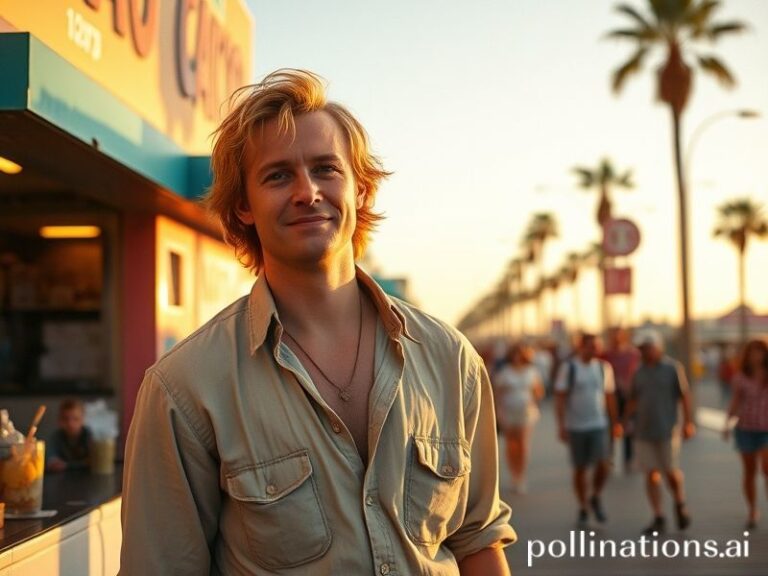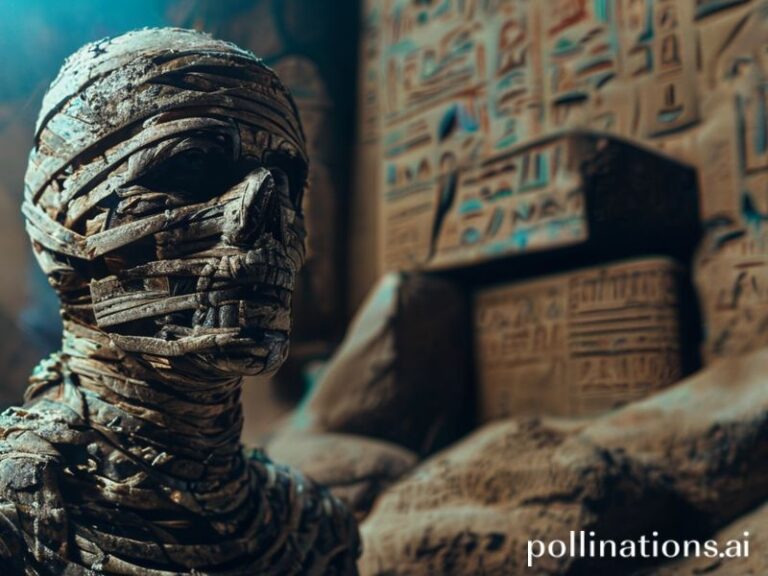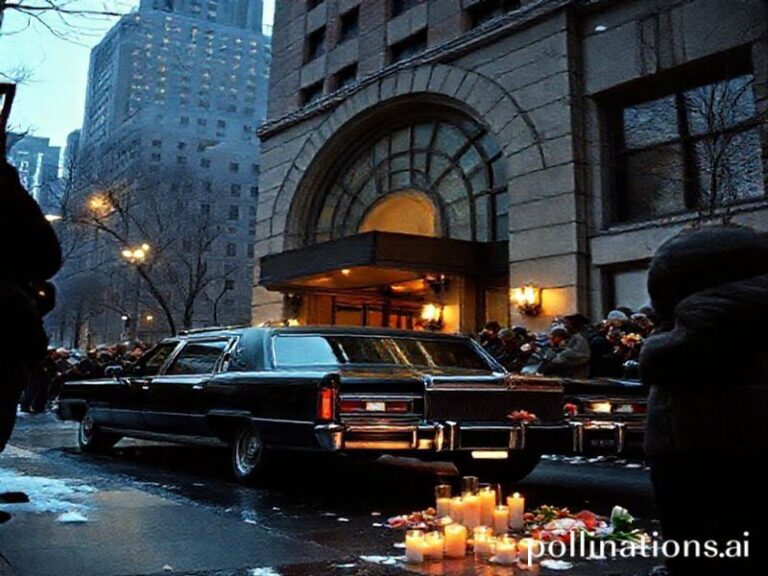De Niro Diplomacy: How One Scowling New Yorker Became the World’s Last Soft-Power Superweapon
Robert De Niro, International Man of (Mild) Mystery
By Our Correspondent in an Airport Lounge Where the Wi-Fi Charges by the Minute
There is a peculiar kind of diplomatic immunity that celebrities acquire once their faces have been projected onto every screen from Lagos to Lagos—yes, both the Nigerian and Portuguese ones. Robert De Niro has spent half a century perfecting that passport: the furrowed brow that once scared a young Al Pacino in a diner now scares customs officials into stamping faster. Across six continents, immigration officers lean in, squint at the passport photo, glance at the man who once asked “You talkin’ to me?”—and decide, prudently, that they are not. Thus does one New Yorker breeze through lines that swallow lesser mortals, a living reminder that fame is the only visa no one can revoke, even when the host nation is in the middle of a coup.
The global implications of De Niro’s career are, on the surface, nil. He is, after all, an actor, not a central banker or a crypto evangelist. Yet consider the data: when “Taxi Driver” was smuggled on VHS into 1980s Romania, Nicolae Ceaușescu’s censors labeled it “ideological nitroglycerine.” Young Romanians watched Travis Bickle’s mohawk like it was a map to personal liberation; within a decade, they were in the streets doing their own improv on political violence. Coincidence? Perhaps. But in the dark corners of every repressive state, someone is screening “Goodfellas” on a cracked laptop powered by a car battery, learning that the American dream sometimes comes with a body count and a voice-over.
Meanwhile, in Singapore—where chewing gum is contraband but capital is sacred—wealth managers quote “The Untouchables” to illustrate escalation dominance. “You get nowhere bringing a knife,” one private banker told me, sipping a US$37 gin and tonic, “unless, of course, the other guy brought a tax amnesty.” De Niro’s filmography has become a shared syntax of power, greed, and paranoia. From Lagos (Nigeria this time) boardrooms where oil ministers binge “Casino” to Tokyo hostess clubs that project “Heat” on mute above the karaoke screen, his grimaces are the closest thing the 21st century has to a universal language. Esperanto died; De Niro survived.
The irony, naturally, is that the man himself now spends much of his time shouting at clouds—specifically, the orange-tinted cloud currently squatting over American democracy. De Niro’s pivot from taciturn antihero to dyspeptic #Resistance uncle has provided endless amusement abroad. In Paris, where cynicism is the national sport, Le Monde ran a cartoon of De Niro giving the finger to a baby balloon of Donald Trump floating over Westminster. Caption: “L’art de la délicatesse.” In Moscow, state television repurposed the same image to show how Hollywood decadence breeds impotent rage. Somewhere in between, the rest of us drink our flat whites and wonder if Travis Bickle finally got himself a Twitter account.
His business ventures abroad add another layer of delicious contradiction. There’s Nobu, the sushi chain co-owned by De Niro and a Japanese chef who once catered to Peruvian guerrillas. A plate of black cod now costs the equivalent of a Manila teacher’s monthly salary, proving globalization’s core thesis: everything eventually becomes unaffordable irony. Then there’s the still-born resort in Astana, Kazakhstan, canceled when oil prices belly-flopped in 2014. The blueprints—leaked by a disgruntled architect now driving Uber in Warsaw—show a hotel shaped like a revolver cylinder. Somewhere, a Kazakh official still wakes up sweating, remembering the pitch meeting where De Niro muttered, “Yeah, guns, very on brand.”
Yet for all the mockery, De Niro remains the last American export that doesn’t require an export license. When Netflix dropped “The Irishman,” screen time zones crashed in Bangladesh; piracy sites from Montevideo to Minsk reported record traffic. Viewers sat through three and a half hours of digital de-aging just to watch a morality play about men who never apologize, a concept so alien in many cultures that local subtitles had to invent new verbs. In Seoul, a megachurch pastor used a clip of De Niro stomping a grocer to illustrate divine wrath. The congregation nodded, recognizing the face even if the theology was suspect.
In the end, De Niro’s worldwide significance is precisely that he signifies nothing and everything at once. He is a floating signifier with a New York accent, a blank canvas onto which every culture projects its own neuroses about America: violence, charisma, regret, and the stubborn belief that if you squint hard enough, the American dream looks like a diner at 3 a.m. and someone offscreen asking, “You talkin’ to me?” The planet keeps rotating, empires rise and fall, but somewhere tonight a customs officer will look up from a passport, swallow hard, and decide not to ask that question. Call it soft power, call it brand recognition, call it the last functional multilateral agreement. Whatever it is, it gets stamped.







